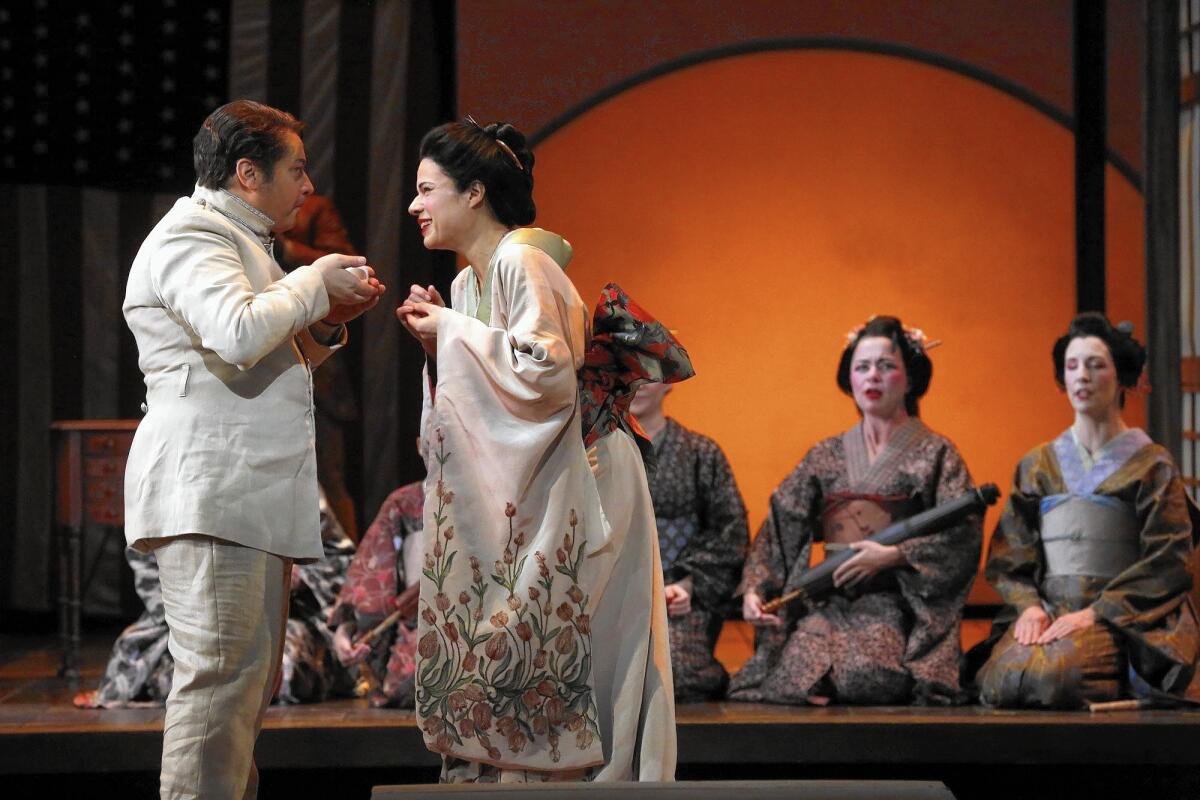Review: As for Los Angeles Opera’s ‘Madame Butterfly,’ go for the music

- Share via
Los Angeles Opera came into being in 1986 with a stellar production of Verdi’s “Otello.” It was a historic occasion at the Dorothy Chandler Pavilion. The next evening the company presented Puccini’s “Madame Butterfly,” and Martin Bernheimer wrote in these pages that overnight the new company had managed with its second opera the dubious feat of settling into “tired, dutiful, predictable routine.”
Over three decades, multitudes of “Butterflys” — sad and exquisite Lepidoptera, colorful and gutsy ones, but also several blanched and boring ones — have now fluttered across this stage. I don’t know for sure whether this is the opera the company has performed the most or whether it just seems that way. A Times review in 1999 of L.A. Opera’s “Madame Butterfly” had the headline “Letting Loose Yet Another ‘Butterfly.’”
------------
FOR THE RECORD
A review in the March 15 Calendar section referred to a “Turandot” production last month by Opera Pacific. The production was by Pacific Symphony. Also, an earlier version of the review erroneously said L.A. Opera came into being in 1996; it was 1986.
------------
Since then, there have been yet more versions of this romantic tale of an American naval officer jilting a teenage geisha in Nagasaki at the beginning of the 20th century, and Saturday night came the latest. Lee Blakeley’s realistic production, obtained from Santa Fe Opera, is decent if not innovative. Ana María Martínez proved a commanding Cio-Cio-San (a.k.a. Butterfly), as she reportedly had recently at the Metropolitan Opera. James Conlon conducted with theatrical urgency, and the L.A. Opera orchestra, which obviously knows this score well, played magnificently.
But is it time to call in the exterminator to deal with the Southern California Puccini onslaught? Nearly half of L.A. Opera’s season on its main stage is devoted to the composer — “Gianni Schicchi” opened the season, “La Bohème” will close it in May.
Meanwhile, “Madame Butterfly” migrates to San Diego Opera in April, as does “Gianni Schicchi” to Santa Barbara Opera (in a double bill with Puccini’s “Suor Angelica”). Last month, it was Opera Pacific’s turn with “Turandot.” In July, the Los Angeles Philharmonic turns to “Tosca,” conducted by Gustavo Dudamel at the Hollywood Bowl — Dudamel’s third Puccini opera in four months (he has “Turandot” at Vienna State Opera in April and guest conducts the last two performances of the L.A. Opera “Bohème” in June).
It is tempting to think that such adoration for the most populist of opera composers reflects the populist mood in the U.S. at the moment. Even this summer’s scholarly Bard Music Festival will be devoted to Puccini and his world, with special attention paid to the perversion of Puccini’s early 20th century works by Italian fascists, as well as the way the operas have often been staged as anti-fascist art. Puccini evidently suits both sides of the aisle.
Opera companies, of course, plan years in advance. Still, you can’t avoid the political, cultural and social aspects in Puccini, and especially not in “Madame Butterfly,” with its early 20th century European Orientalist attitudes toward Japan and its romantic tenor lead, Benjamin Franklin Pinkerton, who proudly proclaims his skill at deal-making in both real estate and marriage. “A man of the world profits from it,” the American consul Sharpless says, whether or not dubiously being left up to the interpretation.
In Blakeley’s production, American crudeness is not downplayed. Designed by Jean-Marc Puissant, a small, revolving pavilion featuring sliding screens and surrounded by desert plants looks at first as if this could be Palm Springs as much as Nagasaki, were it not also for cherry blossoms (blooming out of season, given the summer linens the men wear).
A huge American flag is hung, taking up a full wall of the pavilion.
For the second act, Cio-Cio-San wears Western dress and annoyingly hams up the culture clash of her clumsy attempts at taking on American ways. Stefano Secco’s Pinkerton is more blandly clueless than awful. The fact that he was good-naturedly booed as the villain during his curtain call was clearly the overstated — and not all that believable — effect he had on Cio-Cio-San.
Period touches don’t add much. Power lines appear in the second act to provide a now gritty and lonely feel to the neighborhood.
Westernizing Japanese characters who are sung by Western singers is, however, a handy route for confusion, such as dressing a burly Texan baritone in jodhpurs as the wealthy suitor, Yamadori, although Daniel Armstrong sang ably. Keith Jameson’s effectively wily Goro wore what resembled, from afar, a shark-skinned suit (Brigitte Reiffenstuel designed the costumes). Blakeley gives Cio-Cio-San’s suicide a tasteless final flourish.
Go for the music. Martínez’s attempts at being Japanese rarely convince. She’s an old-school verismo singer, with a wonderful depth of tone and superb articulation, and she is best left simply to emote, and that happens a lot. Her soprano makes a fine, dark mix with Milena Kitic’s rich mezzo-soprano, Suzuki, Cio-Cio-San’s older servant. Kihun Yoon’s Sharpless lacks character, but the smaller roles and chorus maintain high musical levels.
Cio-Cio-San’s small son is the production’s special surprise. The 5-year-old Nicholas Cuenca Terry was able to achieve long stretches of Zen-like stillness that made him seem the one real Japanese character on stage and the one able to restore a sense of mystery a too literal production might have otherwise missed.
------------
‘Madame Butterfly’
Where: Dorothy Chandler Pavilion, downtown Los Angeles
When: 2 p.m. Sunday and April 3; 7:30 p.m. March 23, 26 and 31
Tickets: $59-$369
Info: (213) 972-8801 or www.laopera.org
Running time: 2 hours, 40 minutes
More to Read
The biggest entertainment stories
Get our big stories about Hollywood, film, television, music, arts, culture and more right in your inbox as soon as they publish.
You may occasionally receive promotional content from the Los Angeles Times.











